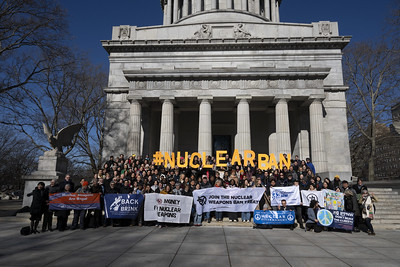
by Sr. Carol Gilbert, OP, and ICAN — Photo Credit ICAN-Darren Ornitz
In 2007, the Dominican Sisters ~ Grand Rapids established this Direction Statement: “We call upon the United States government to lead the way for the global abolition of nuclear and all weapons of mass destruction by adopting a plan to lock down, dismantle, reduce and eliminate nuclear and all weapons of mass destruction. We believe all creation, including Earth itself, to be sacred and we stand in witness to the triumph of life over death, love over hatred, and hope over fear.
“We believe that humanity has been living in the shadow of nuclear weapons for too long. Earth has been desecrated by the testing of nuclear arms. Nuclear weapons and other weapons of mass destruction continue to pose a threat to all creation. Our country cannot rightly seek to halt the spread of nuclear and other weapons of mass destruction, while maintaining our own stockpile of weapons and developing new armament capabilities. We stand with scientists and military leaders who believe that eliminating nuclear weapons will make our world safer for all forms of life. The first step is to develop a detailed plan to lock down, reduce and eliminate nuclear and all weapons of mass destruction.”
Eliminate nuclear weapons before they eliminate us!
My personal protests started in Michigan in the 1980s. Working beside †Ardeth Platte, OP, we focused on raising awareness about the use of nuclear weapons and the humanitarian and environmental disaster the world and its citizens would face if any country activated a weapon. Collaborating with others, we worked with lawmakers in the State of Michigan to declare it a nuclear weapons-free grounds. At this writing, it remains a nuclear weapons-free zone.
2025 is the 80th anniversary year of the invention of nuclear weapons, the first nuclear test in New Mexico, and the bombings of Hiroshima and Nagasaki that killed hundred of thousands of people, including more than 28,000 children. It is also 80 years since the founding of the United Nations.
On July 7, 2017 – following a decade of advocacy by the International Campaign to Abolish Nuclear Weapons (ICAN) and its partners – an overwhelming majority of the world’s nations adopted a landmark global agreement to ban nuclear weapons, known officially as the Treaty on the Prohibition of Nuclear Weapons. It entered into force on January 22, 2021.
Prior to the treaty’s adoption, nuclear weapons were the only weapons of mass destruction not subject to a comprehensive ban, despite their catastrophic, widespread and persistent humanitarian and environmental consequences. The new agreement fills a significant gap in international law.
It prohibits nations from developing, testing, producing, manufacturing, transferring, possessing, stockpiling, using or threatening to use nuclear weapons, or allowing nuclear weapons to be stationed on their territory. It also prohibits them from assisting, encouraging or inducing anyone to engage in any of these activities.
And yet the work to abolish nuclear weapons from our planet continues, and is even more urgent!
Today, the United States has 3,700 nuclear weapons. It has NOT yet signed or ratified the Treaty on the Prohibition of Nuclear Weapons.
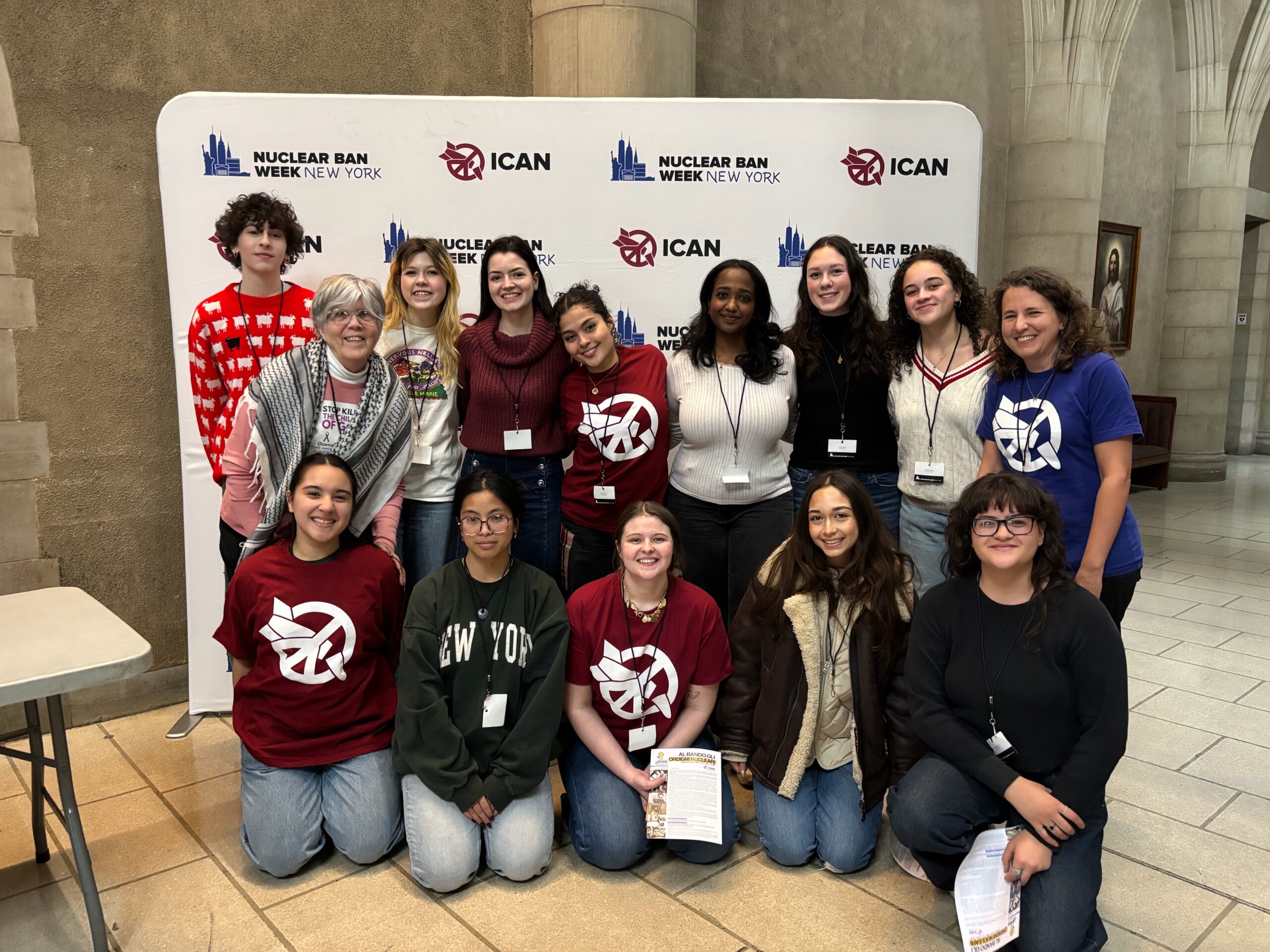
Sr. Carol Gilbert, OP, mentoring students from PACE University, who participated in ICAN gatherings this week during Third Meeting of States Parties (3MSP)
ICAN Urgently Advocating for Abolishment of Nuclear Weapons
ICAN campaigners gathered on March 2 at the all day ICAN Campaigner Forum held at Riverside Church in New York City. ICAN reported: We gathered in advance of the Third Meeting of States Parties to the Treaty on the Prohibition of Nuclear Weapons. With the elevating risks of nuclear weapons use and the need to increase global popular understanding of the cumulative, complex, cascading and catastrophic effects if they are used — ICAN is calling for people to join us with the fierce urgency of this moment. This meeting brought together over 350 participants in attendance from 35 countries, connecting ICAN partners and allies in efforts to eliminate nuclear weapons and support justice for those affected by nuclear weapons use and testing. This interactive campaign event also provided a moment for ICAN partners and allies to renew and revive relationships with one another, strengthening the global movement to end nuclear weapons.
Photo Credit ICAN-Darren Ornitz
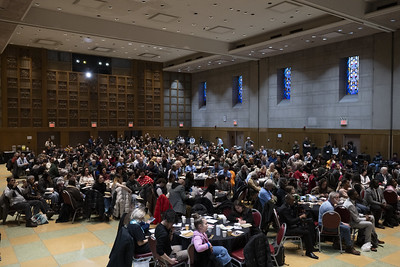
The Treaty on the Prohibition of Nuclear Weapons (TPNW) calls for meetings of states parties to be held on a biennial basis and review conferences at six-year intervals to “consider and, where necessary, take decisions in respect of any matter with regard to the application or implementation of this Treaty, in accordance with its relevant provisions, and on further measures for nuclear disarmament.
The Third Meeting of States Parties (3MSP) was held March 3-7, 2025 at United Nations Headquarters in New York, with Kazakhstan serving as President.
As a campaigner for ICAN and the Treaty on the Prohibition of Nuclear Weapons, I attended this year’s events at the United Nations and other locations in New York City during this important week.
I also attended evening Mass with Archbishop John C. Wester of Santa Fe New Mexico presiding. New Mexico was the site of early testing of the nuclear bomb before it was dropped on Japan in 1945. On Wednesday, he spoke at the 3MSP Trustees meeting.
The 3MSP started each day with an ICAN meeting followed by the trustees meetings from 10:00 am-1:00 pm and 3:00-6:00 pm. In between those times we were choosing from over 70 side events and trying to eat. We were from 86 countries with 163 civil society organizations represented.
The meeting also counted the active participation of a thousand representatives from 163 civil society organizations, including many affected community voices, and nine International organizations. Over 70 events took place in the context of the 3MSP, in the UN and across the city during Nuclear Ban Week.
Photo Credit ICAN-Darren Ornitz
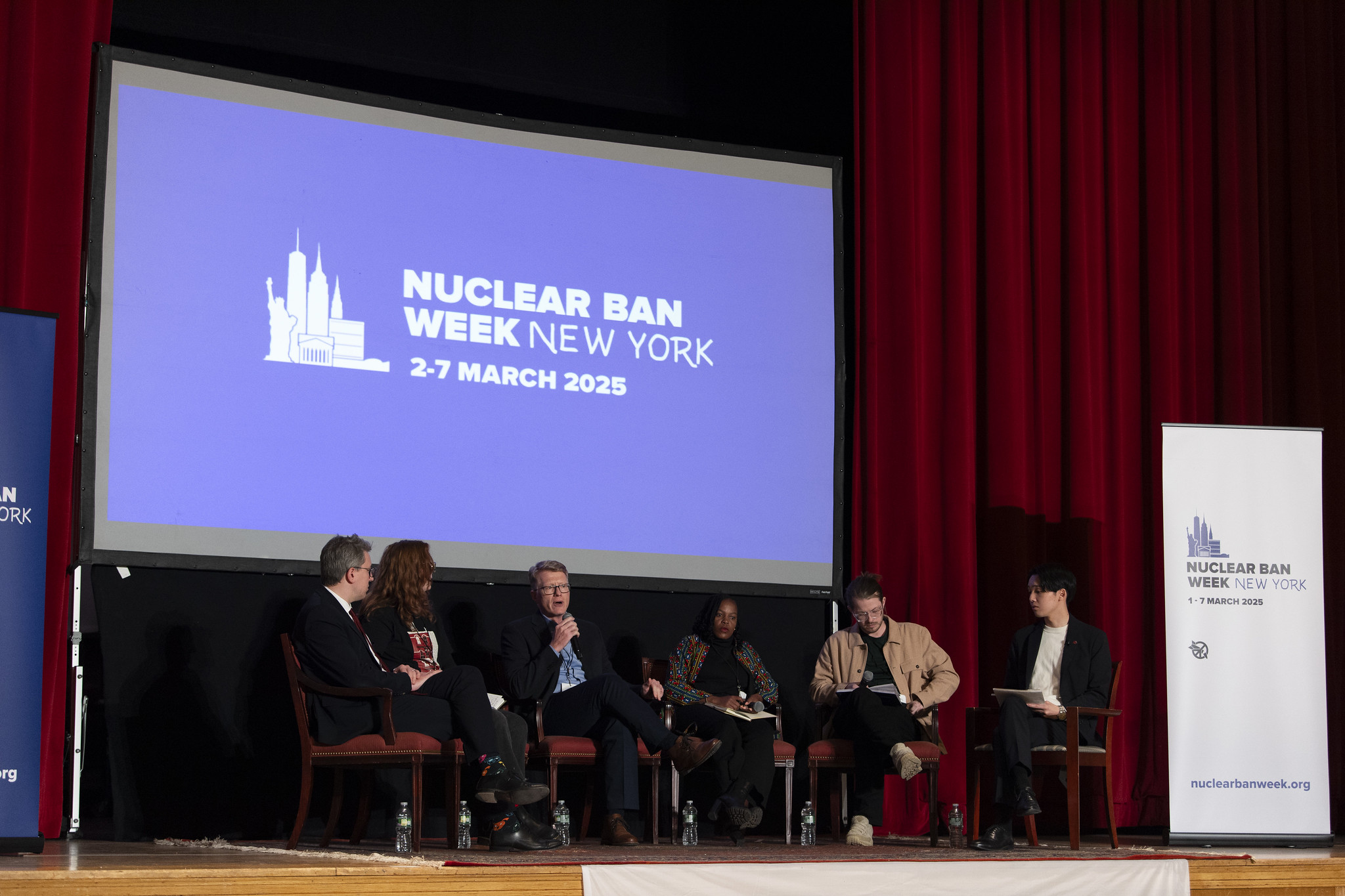
Highlights of Gatherings
- TPNW states parties are taking responsibility and showing leadership to put an end to the threads nuclear weapons and nuclear deterrence pose to their — and everyone else’s– security. States parties recognized that “nuclear weapons are a threat to the security, and ultimately the existence, of all states, irrespective of whether they possess nuclear weapons, subscribe to nuclear deterrence, or firmly oppose it.” This meeting agreed that the best way to advance global security from nuclear weapons is to bring more countries on board the treaty, now including 94 signatories and 73 states parties. The Declaration concluded with an understanding that “challenges before us can, and will, be overcome as we progress in bringing every State to join the Treaty, dismantling every warhead, providing justice to all affected communities, and ending the era of nuclear weapons forever.
- Half the world’s states are “alarmed at international developments, which include increased rhetoric on the proliferation of nuclear weapons.” Many are pushing back against this dangerous escalatory rhetoric in Europe and Asia and rejecting nuclear deterrence because it is a thread to their security, and that these growing dangers “demand immediate and decisive action from the international community.
Photo Credit ICAN-Darren Ornitz
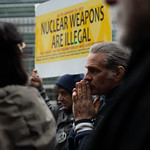
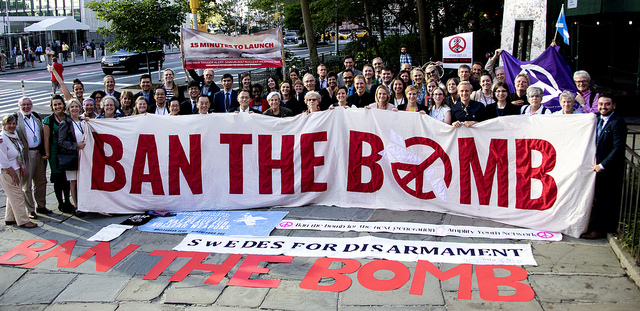
BACKGOUND
ICAN Campaign Honored with Nobel Peace Prize
In 2017, the Norwegian Nobel Committee recognized the International Campaign to Abolish Nuclear Weapons (ICAN) with the Nobel Peace Prize for its efforts to:
• Highlight the humanitarian consequences of nuclear weapons.
• Achieve a treaty-based prohibition of nuclear weapons.
• Influence nations to cooperate in efforts to eliminate nuclear weapons.
How the Treaty Works
The treaty prohibits countries that have joined it from developing, testing, producing, manufacturing, transferring, possessing, stockpiling, hosting, using, or threatening to use nuclear weapons. They must also refrain from assisting, encouraging, or inducing others to engage in these activities.
A country that currently possesses nuclear weapons may join the treaty, so long as it agrees to remove its weapons from operational status immediately and to destroy them in a verifiable and irreversible manner, in accordance with a legally binding, time-bound plan.
Learn more about the treaty here
The treaty is already moving us closer to a nuclear-weapon-free world:
- 80 states have committed to never under any circumstance develop, possess and use nuclear weapons, as well as assist others to do so.
- Over 100 cities are speaking out against their governments and supporting the Treaty on the Prohibition of Nuclear Weapons.
On 7 July 2017, an overwhelming majority of the world’s countries voted to adopt the Treaty on the Prohibition of Nuclear Weapons – a landmark global agreement that outlaws nuclear weapons and establishes a framework for achieving their total elimination. It is gaining ground fast, but to get all countries on board, we need your help.

